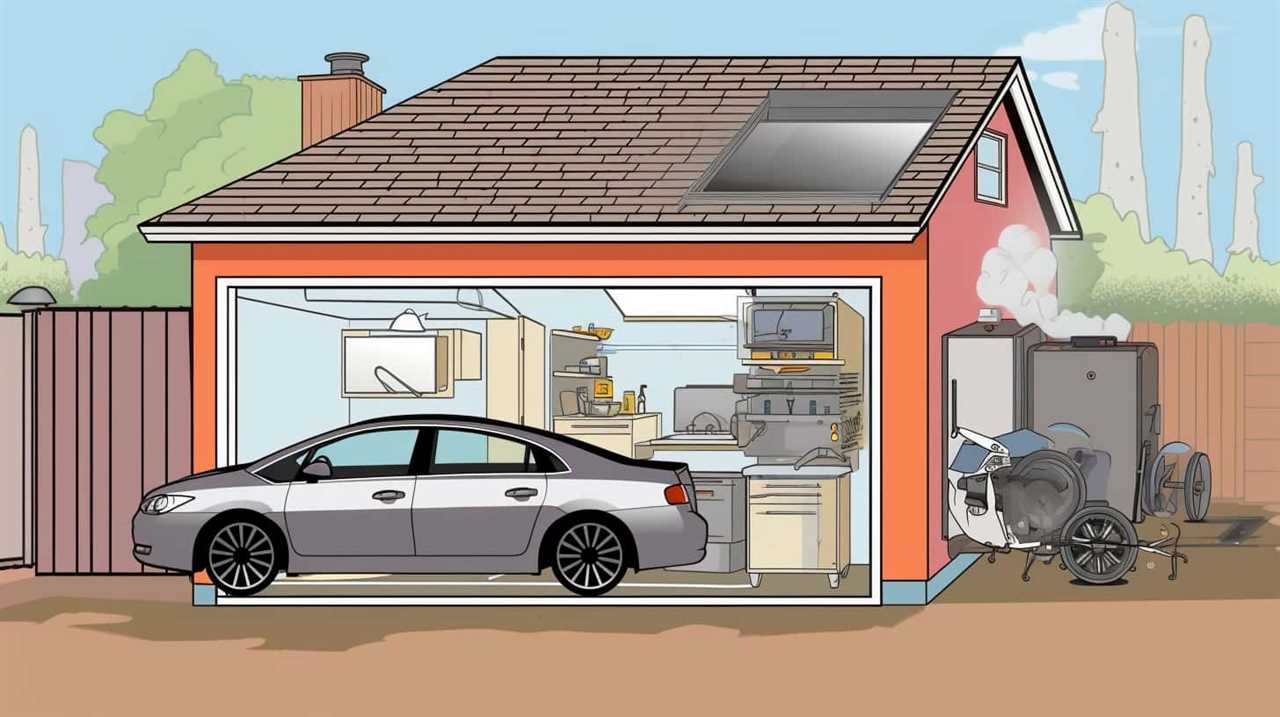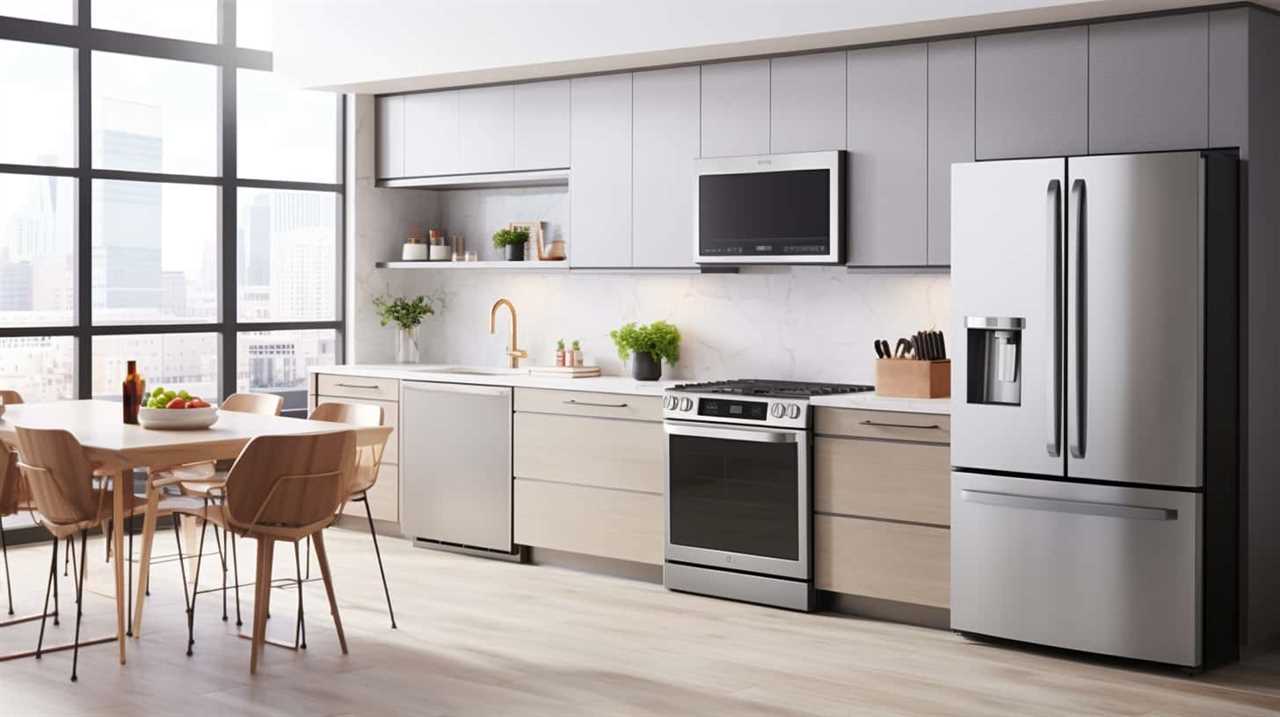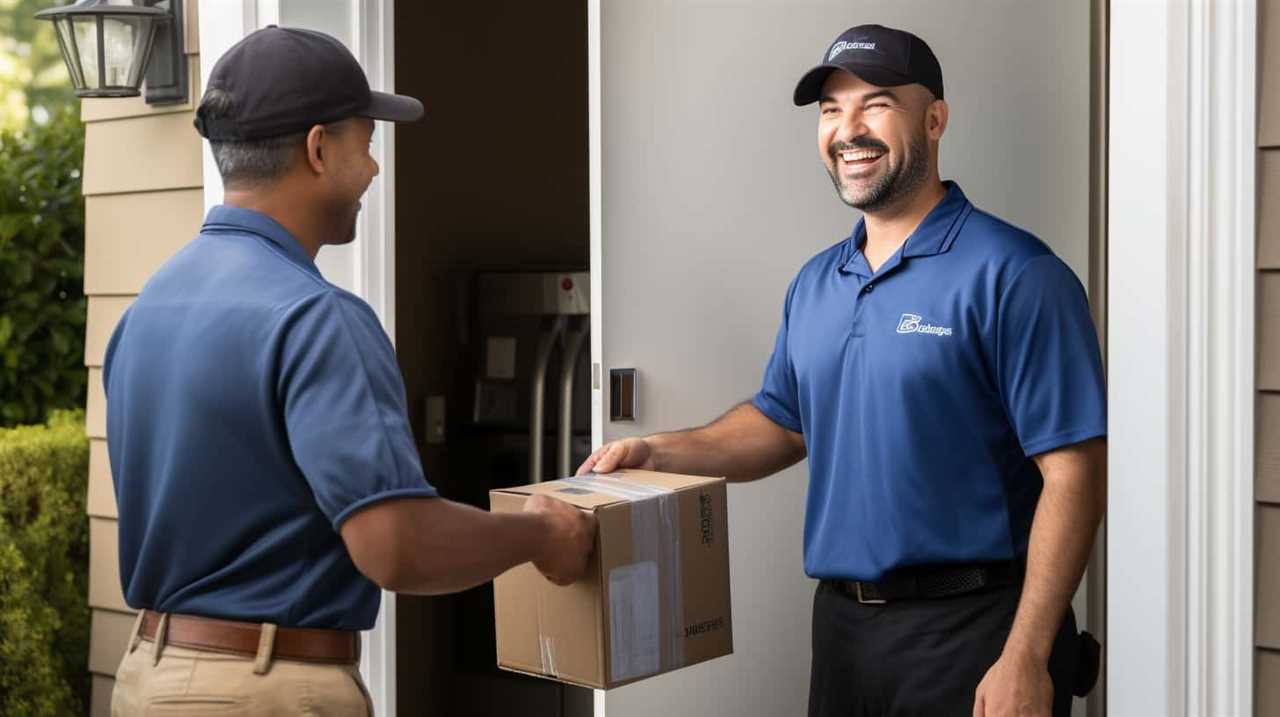Welcome to our detailed guide on appliance safety regulations!
In this guide, we will explore the essential regulations that ensure the safety of appliances in our daily lives. As professionals who seek mastery in this field, it is crucial to understand the importance of appliance safety training and the key regulations that govern it.
We will delve into topics such as:
- Product testing
- Compliance with electrical safety standards
- Proper installation and maintenance
- Addressing potential hazards and risks
Furthermore, we will provide insights into training on safe appliance usage and the proper disposal and recycling of appliances.

This guide aims to equip you with the knowledge and resources needed to ensure the safety of appliances and create a secure environment for all.
Key Takeaways
- Appliance safety training and regulations are crucial for ensuring well-being and preventing accidents.
- Certification demonstrates a commitment to producing safe and reliable appliances, providing assurance and building trust for consumers.
- Compliance with regulations requires staying up-to-date with ever-changing rules, rigorous testing, obtaining certifications, and maintaining comprehensive documentation.
- Ensuring appliance safety involves regular cleaning, inspection, professional installation, thorough maintenance, and educating users on proper operation and emergency procedures.
Importance of Appliance Safety Training
Appliance safety training is essential for ensuring the well-being of individuals and preventing accidents. Continuous learning in this field is of utmost importance, as it allows individuals to stay up-to-date with the latest safety regulations and practices. By actively participating in safety training programs, individuals can develop a deep understanding of potential hazards associated with various appliances and learn how to mitigate them effectively.
The benefits of safety awareness can’t be overstated. Firstly, it empowers individuals to identify potential dangers and take proactive measures to prevent accidents. This includes understanding the proper operation and maintenance of appliances, as well as recognizing warning signs of potential malfunctions. Secondly, safety awareness promotes a culture of responsibility and accountability. When everyone involved in appliance usage, from homeowners to industry professionals, is knowledgeable about safety protocols, the risk of accidents is significantly reduced.
Furthermore, continuous learning in appliance safety fosters a sense of confidence and competence. By acquiring in-depth knowledge and staying updated on best practices, individuals can approach their work with a higher level of expertise. This not only enhances personal safety but also contributes to overall productivity and efficiency.

Key Regulations for Appliance Safety
We need to familiarize ourselves with the key regulations for appliance safety. By understanding these regulations, we can ensure that appliances in our homes and workplaces are safe to use. The importance of appliance safety training can’t be overstated, as it plays a crucial role in preventing accidents and injuries caused by faulty appliances.
One of the key regulations for appliance safety is the requirement for appliances to undergo rigorous testing and certification. This ensures that they meet the necessary safety standards before they’re sold or used. Additionally, there are regulations in place that govern the labeling and instructions provided with appliances. This includes clear and concise information on how to use the appliance safely, as well as any potential hazards or risks associated with its use.
Another important regulation is the requirement for manufacturers to report any incidents or defects related to their appliances. This allows for prompt action to be taken to prevent further accidents or injuries. Furthermore, regulations exist to ensure that appliances are designed and constructed in a way that minimizes the risk of electrical shock, fire, or other hazards.
Understanding Product Testing and Certification
When it comes to appliance safety, understanding product testing and certification is crucial. Certification ensures that the appliance meets the required safety standards and regulations, giving consumers peace of mind.

Testing procedures are designed to assess the performance, durability, and safety of the appliance, ensuring it can withstand normal use without posing any risks.
Importance of Certification
As we delve into the topic of appliance safety regulations, it’s crucial to understand the importance of certification through product testing and certification agencies. The certification process plays a vital role in ensuring that appliances meet the necessary safety standards and regulations. It involves rigorous testing and evaluation of various aspects of the appliance, such as electrical safety, mechanical stability, and fire resistance. By obtaining certification, manufacturers demonstrate their commitment to producing safe and reliable appliances.
There are several benefits of certification. Firstly, it provides consumers with the assurance that the appliance they’re purchasing has undergone thorough testing and meets the required safety standards. This helps to build trust and confidence in the product. Additionally, certification helps to protect consumers from potential hazards and risks associated with faulty appliances. It also benefits manufacturers by enhancing their reputation and credibility in the market, leading to increased customer satisfaction and brand loyalty.
Testing Procedures Explained
Exploring the testing procedures is essential to gain a comprehensive understanding of product testing and certification in appliance safety regulations. The testing procedures play a crucial role in ensuring that appliances meet the required safety standards.

These procedures involve subjecting the appliances to a series of rigorous tests to assess their performance and safety features. The tests may include electrical safety, mechanical stability, thermal tests, and many more, depending on the type of appliance. These tests are conducted in specialized laboratories by qualified technicians who follow strict protocols and guidelines.
The results of the tests are then used to determine whether the appliance complies with the safety standards set by regulatory bodies. Certification is granted only if the appliance successfully passes all the required tests, giving consumers confidence in the product’s safety and reliability.
Understanding the testing procedures is vital to ensure that appliances in the market meet the necessary safety standards.
Compliance With Regulations
To ensure compliance with regulations, we undergo product testing and certification processes. These processes are essential to ensure the safety and quality of our appliances. Here are some key points to consider when it comes to compliance challenges and industry best practices:

- Compliance Challenges: Staying up-to-date with ever-changing regulations can be a challenge. It requires constant monitoring and understanding of the legal requirements for each market.
- Product Testing: Rigorous testing is conducted to assess the safety and performance of our appliances. This includes evaluating electrical, mechanical, and thermal aspects to ensure they meet the required standards.
- Certification: Obtaining certifications from recognized bodies validates that our appliances comply with industry standards. It assures customers that our products are safe to use.
- Documentation: Maintaining comprehensive documentation is vital to demonstrate compliance. This includes test reports, technical files, and conformity declarations.
- Continuous Improvement: We continuously strive to improve our compliance processes by staying informed about the latest regulations and industry best practices. Regular audits and reviews help us identify areas for improvement and ensure ongoing compliance.
Compliance With Electrical Safety Standards
We ensure that our appliances comply with all electrical safety standards. Compliance with international standards and electrical safety guidelines is a top priority for us. By adhering to these regulations, we guarantee the safety and reliability of our products.
To demonstrate our commitment to electrical safety, we follow a rigorous testing and certification process. Our appliances undergo thorough inspections to ensure that they meet all necessary safety requirements. This includes evaluating their design, construction, and performance under various conditions.
In order to provide a clearer understanding of the electrical safety standards we adhere to, the following table outlines some key guidelines and regulations:
| Electrical Safety Standards |
|---|
| International Electrotechnical Commission (IEC) standards |
| National Electrical Code (NEC) |
| European Union’s Low Voltage Directive (LVD) |
| International Organization for Standardization (ISO) |
By complying with these standards, we not only meet the minimum safety requirements but also strive to exceed them. Our dedication to electrical safety ensures that our appliances are safe to use and provide peace of mind for our customers.

Ensuring Proper Installation and Maintenance
Our team ensures that appliances are properly installed and maintained to guarantee safety and optimal performance. Proper maintenance and following installation guidelines are crucial for the longevity and efficiency of appliances.
Here are five important points to consider:
- Regular cleaning and inspection: Periodically clean and inspect your appliances to remove any dirt, dust, or debris that may accumulate. This helps prevent potential hazards and ensures proper functioning.
- Timely repairs: Address any issues or malfunctions promptly. Ignoring problems can lead to further damage and compromise the safety of the appliance.
- Adequate ventilation: Ensure that appliances have sufficient airflow and aren’t obstructed. Proper ventilation prevents overheating and reduces the risk of fire.
- Appropriate placement: Follow the manufacturer’s instructions regarding the placement of appliances. Placing them too close to flammable materials or in cramped spaces can increase the risk of accidents.
- Professional installation: When installing new appliances or making modifications, seek the assistance of qualified professionals. They have the knowledge and experience to ensure proper installation and minimize any potential risks.
Addressing Potential Hazards and Risks
In order to mitigate potential hazards and risks, it’s important to proactively identify and address any safety concerns related to appliance installation and maintenance. By recognizing the potential risks and appliance hazards, we can ensure the safety of both individuals and the surrounding environment.
One of the key steps in addressing potential hazards and risks is conducting a thorough assessment of the appliance and its installation. This involves checking for any faulty wiring, leaks, or other issues that could pose a safety threat. It’s crucial to follow manufacturer guidelines and recommendations during the installation process to minimize the risk of accidents or malfunctions.

Regular maintenance is also essential in preventing potential hazards. This includes cleaning and servicing appliances, inspecting them for wear and tear, and promptly addressing any repairs or replacements needed. By staying proactive with maintenance, we can prevent issues from escalating into more significant risks.
Furthermore, it’s vital to educate users about the safe usage of appliances. This can be done through comprehensive training programs that cover proper operation, maintenance, and emergency procedures. By providing users with the necessary knowledge and skills, we can minimize the likelihood of accidents and injuries.
In the next section, we’ll delve into the importance of training on safe appliance usage and how it can further enhance overall safety.
Training on Safe Appliance Usage
To ensure the safe usage of appliances, it’s important for individuals to receive comprehensive training on proper operation, maintenance, and emergency procedures. Safe appliance handling is a crucial skill that can prevent accidents and injuries. Here are five key points to consider when it comes to training on safe appliance usage:

- Familiarize yourself with appliance safety guidelines: Understanding the manufacturer’s instructions and recommendations is essential for using appliances safely. This includes knowing the appropriate installation, maintenance, and usage procedures.
- Learn about potential hazards: Identifying common hazards associated with appliances, such as electrical shocks, burns, or gas leaks, is vital. Training should cover how to recognize and mitigate these risks effectively.
- Practice proper operation techniques: Knowing how to operate appliances correctly can prevent malfunctions and accidents. Training should include demonstrations and hands-on practice to ensure individuals develop the necessary skills.
- Understand emergency procedures: In case of an appliance-related emergency, individuals should be trained on how to respond quickly and effectively. This includes knowledge of emergency shut-off procedures and basic first aid.
- Stay updated on safety standards: Appliance safety regulations and guidelines may evolve over time. Regular training sessions can help individuals stay informed about any changes or updates.
By providing comprehensive training on safe appliance usage, individuals can confidently handle appliances while minimizing the risk of accidents.
Now, let’s move on to the subsequent section discussing the proper disposal and recycling of appliances.
Proper Disposal and Recycling of Appliances
When it comes to the proper disposal and recycling of appliances, there are several important points to consider.
Firstly, opting for environmentally friendly disposal methods is crucial to minimize the negative impact on the environment.

Secondly, improper disposal can pose hazards such as chemical leaks and fires, making it essential to follow the correct procedures.
Lastly, many countries and organizations offer recycling incentives and programs, providing an opportunity to not only dispose of appliances responsibly, but also contribute to the conservation of resources.
Environmentally Friendly Disposal
We can ensure environmentally friendly disposal of appliances by properly disposing and recycling them. When it comes to disposing of appliances, it’s crucial to consider the impact on the environment and opt for responsible methods. Here are some important points to keep in mind:
- Recycling Programs: Look for local recycling programs that accept appliances and ensure they’re properly recycled.
- Donation: Consider donating working appliances to charitable organizations or individuals in need.
- E-Waste Collection Events: Participate in e-waste collection events organized by local authorities to ensure proper disposal of electronic appliances.
- Manufacturer Take-Back Programs: Check if the appliance manufacturer offers take-back programs for recycling or proper disposal.
- Certified Recycling Facilities: Choose certified recycling facilities that adhere to environmentally friendly recycling practices.
By following these guidelines, we can contribute to e-waste management and promote a sustainable future.

Hazards of Improper Disposal
One significant risk of improper disposal and recycling of appliances is the potential for widespread environmental contamination. When appliances are not disposed of properly, hazardous materials such as lead, mercury, and chlorofluorocarbons (CFCs) can be released into the environment, causing serious harm to ecosystems and human health. It is crucial to understand the environmental impact of improper disposal and take appropriate measures to ensure safe and responsible recycling.
To illustrate the potential hazards, consider the following table showcasing common appliances and their associated hazardous materials:
| Appliance | Hazardous Materials |
|---|---|
| Refrigerator | CFCs, mercury |
| Television | Lead, mercury, arsenic |
| Washing machine | Lead, mercury, PCBs |
| Air conditioner | CFCs, mercury, PCBs |
| Microwave oven | Lead, mercury, PCBs |
Proper disposal and recycling of appliances is essential to prevent the release of these hazardous materials into the environment. It is our responsibility to educate ourselves and take the necessary steps to protect our planet and future generations from the adverse effects of improper disposal.
Recycling Incentives and Programs
To promote the proper disposal and recycling of appliances, our community encourages participation in various recycling incentives and programs. These initiatives aim to create a sustainable environment by reducing waste and conserving valuable resources. Here are some of the recycling programs and incentives that our community offers:

- Cash for Appliances: This program provides financial incentives to individuals who recycle their old appliances. By offering monetary rewards, it encourages people to dispose of their appliances properly and contribute to the recycling effort.
- Rebates and Discounts: Some retailers and manufacturers offer rebates or discounts on new appliances when old ones are recycled. This not only promotes proper disposal but also encourages the purchase of energy-efficient appliances.
- Curbside Appliance Pickup: Our community provides a convenient curbside pickup service for large appliances, making it easier for residents to dispose of their old appliances responsibly.
- Appliance Recycling Events: Regular appliance recycling events are organized, where residents can drop off their unwanted appliances for recycling. These events often include educational programs to raise awareness about the importance of proper disposal.
- Government Incentives: The government offers various incentives such as tax credits or grants to businesses and organizations that promote and implement appliance recycling programs. These incentives encourage widespread participation and support for recycling initiatives.
Resources for Appliance Safety Training
During the process of appliance safety training, it’s important to utilize up-to-date and reliable resources. These resources can provide the necessary knowledge and skills to ensure the safe operation and maintenance of appliances.
Two key resources for appliance safety training are online courses and certification programs.
Online courses offer a convenient and flexible way to learn about appliance safety. They provide comprehensive training materials, interactive modules, and assessments to test your understanding. Online courses often cover topics such as electrical safety, proper handling of appliances, and emergency procedures. Some reputable online platforms for appliance safety training include Udemy, Coursera, and LinkedIn Learning.
Certification programs, on the other hand, offer a more formal and recognized qualification in appliance safety. These programs typically involve a combination of theoretical knowledge and practical skills assessment. They’re often offered by professional organizations or industry associations. Examples of certification programs in appliance safety include the Certified Appliance Professional (CAP) program and the National Appliance Service Technician Certification (NASTeC).

Frequently Asked Questions
What Are the Penalties for Non-Compliance With Appliance Safety Regulations?
Penalties for non-compliance with appliance safety regulations can be significant. It’s crucial to prioritize appliance safety training to avoid these penalties.
Non-compliance could result in hefty fines, legal action, and damage to a company’s reputation. By ensuring that employees are well-trained in appliance safety, companies can mitigate the risk of accidents, injuries, and potential legal consequences.
Compliance with safety regulations not only protects individuals but also demonstrates a commitment to maintaining a safe and secure working environment.
How Often Should Appliances Be Tested for Safety?
Appliance safety testing frequency is a crucial aspect of regular appliance maintenance. It’s essential to ensure the well-being of both users and the appliance itself. Regular testing helps identify any potential hazards or malfunctions, allowing for timely repairs or replacements.

Are There Specific Regulations for Different Types of Appliances, Such as Kitchen Appliances Versus Electronic Devices?
There are indeed specific regulations for different types of appliances, such as kitchen appliances and electronic devices. These regulations outline safety standards and requirements that each type of appliance must meet in order to ensure the safety of consumers.
Additionally, there are enforcement measures in place to ensure that these regulations are followed, such as inspections and penalties for non-compliance.
It’s important for manufacturers, retailers, and consumers to be aware of these regulations to maintain appliance safety.
What Should Consumers Do if They Suspect a Safety Issue With Their Appliance?
If consumers suspect a safety issue with their appliance, they should take immediate action to protect themselves and their rights.

It’s important to document any evidence of the safety issue, such as photographs or videos, and contact the manufacturer or retailer to report the problem.
If the issue isn’t resolved, consumers may have legal recourse to seek compensation or a replacement appliance.
It’s crucial to be aware of consumer rights and consult with a legal professional if necessary.
Are There Any Regulations Regarding the Labeling of Appliances to Indicate Their Safety Compliance?
Labeling requirements for appliances to indicate their safety compliance are an essential aspect of appliance safety regulations.

Compliance labels provide consumers with crucial information about the safety standards that the appliance has met. These labels help consumers make informed decisions and ensure that they’re purchasing safe and reliable products.
Safety compliance is of utmost importance as it ensures that appliances have undergone rigorous testing and meet industry standards for safety.
Therefore, proper labeling is vital in promoting consumer safety and preventing accidents or hazards.
How Important Is It for Landlords to Follow Appliance Safety Regulations?
When it comes to rental properties, appliance safety for landlords is crucial. Following safety regulations ensures the well-being of tenants and protects landlords from potential liability. Regular maintenance and adherence to safety standards can prevent accidents and maintain a safe living environment for all parties involved.
Conclusion
In conclusion, appliance safety regulations are of utmost importance in ensuring the well-being of individuals and preventing potential hazards.

By understanding and complying with these regulations, conducting proper testing and certification, addressing potential risks, and promoting safe usage and disposal, we can create a safer environment for all.
Let’s strive to prioritize appliance safety and stay informed about the latest standards and guidelines in order to protect ourselves and our loved ones.









